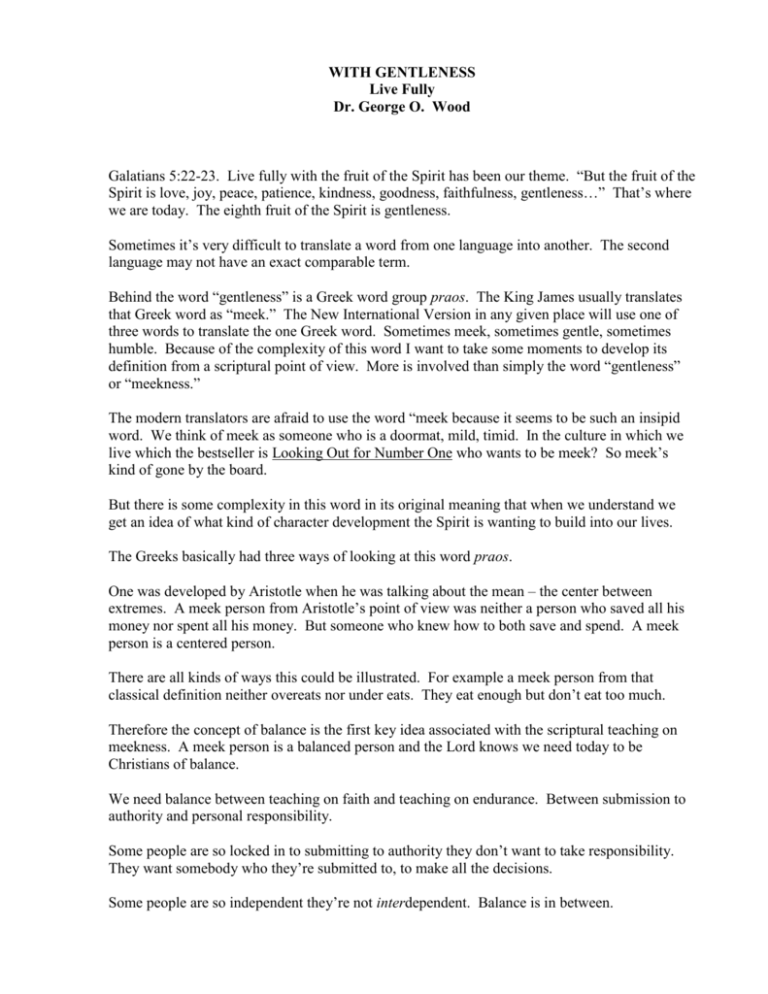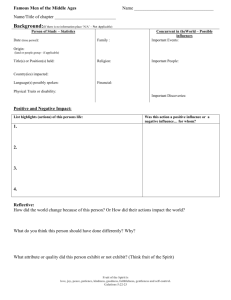Transcript - Dr. George O. Wood
advertisement

WITH GENTLENESS Live Fully Dr. George O. Wood Galatians 5:22-23. Live fully with the fruit of the Spirit has been our theme. “But the fruit of the Spirit is love, joy, peace, patience, kindness, goodness, faithfulness, gentleness…” That’s where we are today. The eighth fruit of the Spirit is gentleness. Sometimes it’s very difficult to translate a word from one language into another. The second language may not have an exact comparable term. Behind the word “gentleness” is a Greek word group praos. The King James usually translates that Greek word as “meek.” The New International Version in any given place will use one of three words to translate the one Greek word. Sometimes meek, sometimes gentle, sometimes humble. Because of the complexity of this word I want to take some moments to develop its definition from a scriptural point of view. More is involved than simply the word “gentleness” or “meekness.” The modern translators are afraid to use the word “meek because it seems to be such an insipid word. We think of meek as someone who is a doormat, mild, timid. In the culture in which we live which the bestseller is Looking Out for Number One who wants to be meek? So meek’s kind of gone by the board. But there is some complexity in this word in its original meaning that when we understand we get an idea of what kind of character development the Spirit is wanting to build into our lives. The Greeks basically had three ways of looking at this word praos. One was developed by Aristotle when he was talking about the mean – the center between extremes. A meek person from Aristotle’s point of view was neither a person who saved all his money nor spent all his money. But someone who knew how to both save and spend. A meek person is a centered person. There are all kinds of ways this could be illustrated. For example a meek person from that classical definition neither overeats nor under eats. They eat enough but don’t eat too much. Therefore the concept of balance is the first key idea associated with the scriptural teaching on meekness. A meek person is a balanced person and the Lord knows we need today to be Christians of balance. We need balance between teaching on faith and teaching on endurance. Between submission to authority and personal responsibility. Some people are so locked in to submitting to authority they don’t want to take responsibility. They want somebody who they’re submitted to, to make all the decisions. Some people are so independent they’re not interdependent. Balance is in between. WITH GENTLENESS Live Fully Some people want the fruit and other people want the gifts. The balanced person wants both. Some have an emphasis on the future. They live for the Lord’s return and neglect the present. Some are so this world they’re not ready for the Lord to come. There must be a balance on forgiveness and repentance. It’s not sufficient just to emphasize God forgives and never to require or expect or to make repentance in our lives. Neither is it proper to focus on repentance and not say also when we repent we’re forgiven. We need a balance between what a person believes and how they behave. Between the concept of freedom – I’m free – and the concept of duty or obligation. Between liberty in Christ – we’re free – and holiness – in Christ we are committed to a high standard of life. Balance. The second key way that this Greek word praos was used in reference to a wild animal that had been tamed. For example a stallion that had been broken – not his Spirit broken but broken so he could be rode. That wild stallion could be called meek. That was a proper way to refer to it. Not because it had become spiritless and become an old nag plodding down the road with its head down. A stallion could be called meek because its energies which had been previously wild and dissipated and had now been captured, channeled, and its energy had been put to a creative and useful means. So a meek person properly is a person who is disciplined. Moses is called that in Numbers 12:3. He is said meek above all men that were on the face of the earth. Moses was no doormat. He’s powerful person. When meek refers to him it is speaking of this imagery of a wild stallion. Moses had been a wild man, killing an Egyptian. As a person living on his own he was very successful in wilderness living. But God captured him and disciplined him and brought his Spirit under control so he became useful to God. These first two meanings for “meek” – the centered or balanced person and the disciplined person logically then lead to the third meaning… The meaning of gentle. A meek person is gentle. “Come unto me,” Jesus says, “For I am gentle…” Only a person who is inwardly strong and confident has the choice of being gentle. Maybe some people give the imagery of being gentle because they’re so beat down that they don’t appear to have had a choice in the matter. But the truly biblical gentleperson is as person who chooses to be gentle. They are a strong person. They are a disciplined person. They are a centered person. With that has come a gentleness. Because they’re strong enough and confident enough that they don’t need to go on some assertive drive to prove who they are. It is the weak and insecure personality that strives to prove his worth. In so doing frequently runs over or runs through other people. A strong, gentleperson doesn’t need to run over other people because they don’t need to prove anything about who they are. 2 WITH GENTLENESS Live Fully Jesus’ own gentleness is seen when he comes riding into Jerusalem on a colt – Matthew 21:5 says that he was gentle and riding on a donkey. Jesus was secure enough that he did not need a power symbol for transportation. He was confident in who he was. He was the king. He could have come in on a stallion but he didn’t need a power symbol for transportation. He could come as a strong person with gentleness. Gentleness makes him and makes us approachable. Show me a gentleperson and I’ll show you someone you can run up to. You feel warm and invited into their presence. They’re approachable. Gentleness makes it possible for others to reach you with their own love. It draws others out. It inevitably means if you’re going to be gentle that you choose to relate to people not from a vantagepoint of power or proving your position. But you choose to relate to other people from the security of inward strength, which brings a gentle Spirit of humility. Meekness then as a fruit of the Spirit describes the balanced and the disciplined Christian who wears gentleness as a garment in life. Strength marks the inward disposition of such a person and softness and touchability mark the outward disposition. It’s wonderful that this is a quality for men as well as for women. The brusque, the haughty, the rude, the demanding, the pushy nature is opposite to the Spirit’s personality. The Spirit is not brusque, he’s not rude, he’s not pushy, he’s not shovey, he won’t elbow you out of line. The Spirit is gentle. How then does the Spirit go to work to cultivate this personality trait within our life? Since the fruit of the Spirit is the evidence of the Spirit’s indwelling presence, since God wants to mature us into the character and personality of Jesus Christ, how does the Spirit bring this quality to pass in our life? Like all the other qualities involved in the fruit of the Spirit it many times will take some opposite pressure to create a corresponding inward dynamic. Sort of creative tension. For example we all know that if you want to develop the fruit of the Spirit called patience there must be something pressing in your life that makes you impatient. It takes corresponding tension to produce the right attribute. As I have looked through all the Greek references to praos in the New Testament I’ve tried to isolate the arena in which that word occurs. Very strongly that word can be grouped in occurring in three kinds of context. You will develop gentleness or meekness when you have persons that oppose you. So if you seek to develop this in your life for a moment mentally think of the people in your life who oppose you. The people who differ from you. The people who give you a rough time. How are we to relate to such people? Paul shows us what a meek person’s attitude is when dealing with clamorous, difficult to get along with people. Writing to the arrogant Christians at Corinth, the super spiritual Christians. We all have to avoid this tendency that once we taste something of the Spirit’s life, we judge other people or other churches as not as Spiritual. It’s a deadly tendency. Corinth had this 3 WITH GENTLENESS Live Fully tendency to wear their spirituality as some sort of prideful badge. Paul has to come to these arrogant people and he says to them “What would you prefer? Shall I come to you with a whip? Or in love and with a gentle spirit?” It’s obvious his preference is to come to them with a gentle spirit. If must, if discipline is needed, if a hard line is what is called for, then the meek person can then be strong. And can come across as assertive and demanding in terms of scriptural guidelines. But Paul says I’d much rather deal with you in a gentle way. Even though you’re arrogant, I’d like to deal with you gently. He hasn’t given up on them when he writes them later in 2 Corinthians 10:1. He’s still appealing to them by the gentleness and meekness of Christ. If need be Paul can be confrontive but his choice is to be gentle first of all with those who opposed him. He writes the Thessalonians “We were gentle among you as a mother cherishing her little children.” When you see that happen, you see an imagery of gentleness. Paul says that’s how I was among you. Think of that in terms of implications of family relationships and the implications of those who oppose us. 1 Thessalonians 2 he talks about being among them even as a father dealing with his own children comforting and urging you to live lives worthy of God. God is calling us to be gentle with people as a mother and a father would be gentle in loving their little children. If we could have that same perspective towards people who get in our way, towards people who oppose us we need to remember we all were once little babies. That person who is causing us so much trouble now perhaps the way they’ll respond and grow best is if we reach out to them in gentle love. The Lord’s servant, Paul said, may not be quarrelsome but must be gentle, kind to everyone. Paul urges those who give a reasoned defense of the Christian faith to do it with gentleness. Again that’s the word meekness. To do it with gentleness and respect. In other words if you’re called upon to give a logical answer to why you’re a believer – suppose you’re talking to an unbeliever, a cult member or some liberal theologian or member of another religion – how do you go about presenting the gospel to them in a reasoned way? Paul says is the midst of your reason do not neglect gentleness and respect. Why is that so important? Because without gentleness and respect the gospel does not open up to them through us because we ourselves then become judgmental, unapproachable kinds of persons. There is a way to present the gospel to others that on the one hand holds forth the truth while on the other hand does not come across to people as condemning and judgmental and keeps them from really responding and wanting to respond to what we have to offer. Paul says your presentation of the gospel must be with gentleness and with respect. It is never appropriate to witness to the truth in an unloving way. You can be theologically right in defending Christian truth but ineffective if your witness is not coming out of a gentle Spirit. Is there anybody who opposes you? Do you have the strength to be gentle with them? It’s wonderful to know that gentleness is a characteristic of the Holy Spirit. We have a lot of wrong ideas about the Holy Spirit. Like when we do something wrong he’s sort of God’s dispatcher whose job it is to aim the arrow and pick us off. Or take the club and bat us back in line. But the Spirit himself is gentle. He’s portrayed as a dove. He does not cuff me, he does not smash me. 4 WITH GENTLENESS Live Fully He gently works with me. Who sometimes because of my own failures in that moment God’s opponent. Only when a person consistently refuses to respond to the gentleness of the Holy Spirit will he respond with rebuke. The Spirit is strong enough to be gentle. The second way that this idea of gentleness occurs in the New Testament, the second context, not only with those who oppose us but with those who correct us. James 1:21 “Get rid of all moral filth and the evil which is so prevalent and humbly [or meekly or gently] accept the word planted in you.” How are you to accept the word that comes to correct you when you’re wrong? You’re to receive that word gently. Whenever I am in doubt about a person’s exercise about a particular Spiritual gift in a worship service I will go to them and talk with them about that. I can immediately tell whether a person who’s exercised a gift is a spiritual person or not by how they receive me when I make inquiry or in some cases make a correction. When a correction is made with gentleness it also if it is a spiritual person, will be received with gentleness. There are some people I’ve known of when they’re corrected on the misuse of a spiritual gift, immediately get in a huff, stamp their foot, and say, “This group isn’t spiritual because they didn’t receive what I did and therefore that proves they weren’t spiritual.” They in anger walk out. Receive correction as James’ word says, gently. Nobody likes to be corrected. I hate to be corrected. But on the other hand the other side of me wants to be corrected. Sometimes a correction may be justified. Sometimes it’s not justified at all. But how do you respond? You know who the most corrected people are? They’re under eighteen. The teenagers and the children are the most corrected people probably in the church today. Kids, teenagers, how do you respond with somebody corrects you? Do you get ticked off and go slam the door and turn up the radio or stereo? What do you do? You’ll be miles ahead in your life if when you’re corrected even if you don’t feel that the person correcting you is right, you’ll be miles ahead in your life if you receive correction with gentleness. Receive that correction with a gentle spirit and not come back in a kind of hard way. The Lord calls us to gentleness. Most correction takes place within the home. That’s where gentleness is most needed – within our family relationships. Peter urges the Christian wife to have the unfading beauty of a gentle and quiet spirit. And Paul tells husbands to love their wives as Christ loves the church. Any husband that loves his wife as Christ loves the church is going to be a gentleperson. Such a bride is going to adore the ground that their groom walks on. Paul says in Ephesians 4:2 that unity in the home comes when we are completely humble and gentle. Instead of brusque, quick, shovey. We become open to change when there’s gentleness. Gentleness when we are corrected. The third setting for gentleness in the scripture is those who fail us. Gentleness comes as a person who’s failed is being restored. Paul says to the Galatians in 6:1 “Brothers if someone is caught in a sin you who are spiritual should restore him gently.” Somebody’s wrong – 5 WITH GENTLENESS Live Fully somebody’s done something that’s not right before God or before you how do you restore them? Restore them gently. Don’t treat them harshly. But treat them lovingly, tenderly, carefully. When we cross swords with another person our tendency is to cut them off. That’s what the human tendency wants to do. It’s what a wounded heart always wants to say. But thanks be to God, he gives us power to have another response. If we are like him we will ask his Spirit to create the same response in us toward another who has failed us, as the Lord himself would have. We must not respond to anyone in a manner different than Jesus would. With his help we can live fully with gentleness. Those who oppose us, those who correct us, those who fail us. God can help us to live gently. Our Father, we come to the close of these moments of worship and exposure to your word. We want to thank you that you are gentle with us. Lord, free persons here from the false idea that you have come as someone to deal harshly with them. There may be persons here in this worship service that are struggling greatly with a sense of having failed you, having sinned against you. They really don’t have any sense of confidence of how you would treat them, how long you would put them on probation. Lord, when we’re wounded, when we’re hurt, when we have sinned you come to us as a gentle Christ. You come to us as the shepherd that seeks the hurt lost lamb and you fold that lamb in your bosom and gently you care for that lamb. Such we are. God, you treat us gently. We pray for gentleness in our relationship with others. There are families represented here today where this week many harsh words have been spoken. Maybe some harsh actions. You’re calling us to gentle one another. To be gentle with our words, gentle with our attitudes, gentle with our actions that you might live in us. Live in us fully, Lord. Let this fruit also be present in us – gentleness. In our Lord’s name we pray. Amen. 6








